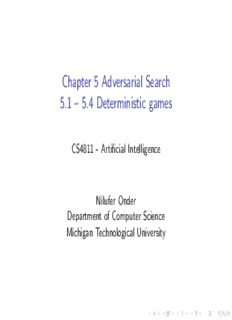
Chapter 5 Adversarial Search 5.1 – 5.4 Deterministic games PDF
Preview Chapter 5 Adversarial Search 5.1 – 5.4 Deterministic games
Chapter 5 Adversarial Search 5.1 – 5.4 Deterministic games CS4811 - Artificial Intelligence Nilufer Onder Department of Computer Science Michigan Technological University Outline Two-person games Perfect play Minimax decisions α−β pruning Resource limits and approximate evaluation (Games of chance) (Games of imperfect information) Two-person games (cid:73) Games have always been an important application area for heuristic algorithms. (cid:73) The games that we will look at in this course will be two-person board games such as Tic-tac-toe, Chess, or Go. (cid:73) We assume that the opponent is “unpredictable” but will try to maximize the chances of winning. (cid:73) In most cases, the search tree cannot be fully explored. There must be a way to approximate a subtree that was not generated. Two-person games (cont’d) Several programs that compete with the best human players: (cid:73) Checkers: beat the human world champion (cid:73) Chess: beat the human world champion (cid:73) Backgammon: at the level of the top handful of humans (cid:73) Othello: good programs (cid:73) Hex: good programs (cid:73) Go: no competitive programs until 2008 Types of games Deterministic Chance Perfect information Chess, checkers, Backgammon go, othello , monopoly Imperfect information Battleships, Bridge, poker, scrabble Minesweeper “video games” Game tree for tic-tac-toe (2-player, deterministic, turns) A variant of the game Nim (cid:73) A number of tokens are placed on a table between the two opponents. (cid:73) A move consists of dividing a pile of tokens into two nonempty piles of different sizes. (cid:73) For example, 6 tokens can be divided into piles of 5 and 1 or 4 and 2, but not 3 and 3. (cid:73) The first player who can no longer make a move loses the game. The state space for Nim Exhaustive Minimax for Nim Search techniques for 2-person games (cid:73) The search tree is slightly different: It is a two-ply tree where levels alternate between players (cid:73) Canonically, the first level is “us” or the player whom we want to win. (cid:73) Each final position is assigned a payoff: (cid:73) win (say, 1) (cid:73) lose (say, -1) (cid:73) draw (say, 0) (cid:73) We would like to maximize the payoff for the first player, hence the names MAX and MIN.
Description: